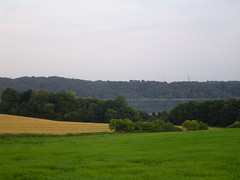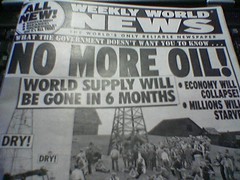Thanks to
Mark D. for
this link from
The Economist on the recent furor over
Grand Theft Auto: San Andreas. In case you haven't been following along, the
GTA series is one of the most successful game franchises in industry history, specializing in the crime/action genre of gaming. Technically, one of its major breakthroughs was the development of a free-roaming universe in which the player can wander around and engage the environment, chosing to follow missions and advance the game narrative at their will. Content-wise, the game took things a step further in the way of "mature content," as players are able to solicit prostitutes, buy and sell drugs, and as per the title, jack cars and go on high-speed chases. In
GTA:SA, you play Carl Johnson, a young, black man who returns to his neighborhood in a fictionalized south-central LA. You guide him through missions as he builds up his drug business, eliminates rivals, pulls of a stunning variety of crimes, and becomes a major drug crimelord.
Recently, with the release of the PC-version of the game, some enterprising hackers found a way to unlock hidden mini-games that included a clothed simulation of sex between CJ and a prostitute. To be clear, these mini-games were not intended to be found, and are different from "easter eggs," which are included with the full intention of being found by gamers using secret codes, etc. The hack, labeled "Hot Coffee," requires the user to break into the game in the same way that you would hack into a secure website. The mini-games, to my understanding, were left in the code but "turned off," meaning that there were no ways to access the code through regular game-play. "Turned off" code happens a lot more than people outside the industry realize. The code behind any game is often like a very messy stack of cards, a stack in which certain cards are glued together in unpredictable ways. Trying to take out one section of code can have unpredictable results in the game, leading to bugs that are difficult to find during playtesting and often expensive and nervewracking to fix when you do (often at the last minute possible). Sara can tell you stories of me disappearing for days during playtesting because of minor changes to the game resulting in radically unpredictable bugs.
So rather than removing the code, they hid it in a way that nobody should have been able to access it. Of course, somebody found it, released the hack, and provided various politicians and other politically-motivated parties their opportunity to make an easy gesture. Most notable was Hillary Clinton, who has asked for increased regulation and fines for videogames.
The thing that bugs me about all of this is that there are already significant, self-imposed regulations of the game industry in place, ones that mirror those found in the film and music industries. The game was already rated M for Mature because of its suggestive and violent content, similar to an R rating for films, and couldn't be purchased without an adult. The uproar has led RockStar games to change the rating to Adults Only, practically a first in the industry. They're also facing some class-action suits, have seen their game banned in Australia, removed from the shelves of most major videogame outlets, and have been forced to re-release a version of the game without the hidden content. All of this costs time and money, which granted, RockStar has plenty. Who knows, all of this may be a media manipulation on RockStar's part. They've not shied away from courting controversy to date.
But to make clear, the hidden mini-games, of which only the population that has purchased the game in PC version (the hack doesn't work on consoles that I'm aware of) and which can only be accessed by downloading an illegal hack,
don't even show the characters naked. They're fully clothed! As far as sexual content, if this were a film, it would merit a PG-13 rating at most. However, Clinton, et al, seem to be arguing that videogames as a medium have some greater level of influence over their audiences and therefore merit harsher regulation.
The Economist essay does a good job of pointing out the inconclusive results of any study of game influence on player behavior, as well as hypocrisy of leveling disproportional critique at one medium that is already policing itself. It also points out the obvious fact that this kind of politically opportunistic "controversy" has accompanied every major creative medium since the origins of drama and poetry in Aristotle's day. It's close to an eternal truth that parents won't understand what they didn't grow up with. But what I think is most important in the essay is its inclusion of the fact that most game players, 43%, fall between the ages of 18 and and 49. Up until this point, I still had some lingering respect for Hillary Clinton, but my sense is that she and her political cohorts on this issue still can't imagine that adults exist who play these games and are also able to understand the inherent double-standard being imposed on the videogame industry. Clinton is making what she seems to see as an easy play for the middle here. Unfortunately for Hillary, 18 is also the age at which people get the vote. I'm crossing my fingers that this comes back to haunt her.



